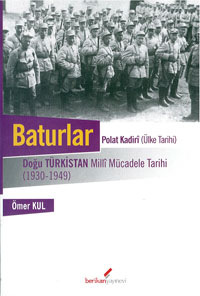Two books have been republished recently that will be of interest to scholars of Xinjiang in the Republic:
- Kadirî, Polat. Baturlar (Ülke tarihi): Doğu Türkistan Millî Mücadele Tarihi (1930-1949). Edited by Ömer Kul. Ankara: Berikan Yayinevi, 2009.
- Forbes, Andrew D. W. Warlords and Muslims in Chinese Central Asia: A Political History of Republican Sinkiang 1911-1949. 2nd ed. Bangkok: White Lotus, 2010.

The first is a reissue of a rare book published in Ürümchi in the 1940s. Although given the Turkish title Baturlar (Heroes), it is actually a new edition of Polat Qadiri’s Ölke tarikhi, published by the Altay Publishing House in 1948. The Altay Publishing House was the publishing arm of the Guomindang-aligned Uyghur nationalists who enjoyed a brief period of prominence in Ürümchi, between Sheng Shicai’s fall in 1944 and the coming of the Red Army in 1949. These years rate as the high point in the careers of many anti-Communist Uyghur intellectuals and politicians, most notably Mühemmed Imin Bughra and Isa Yusuf Alptekin. Before it appeared in book form, Qadiri’s work was printed in the nationalist newspaper Erk (Freedom), which carried on its banner Ismail Gasprinky’s Panturkist slogan dilde, fikrde, işte birlik “unity in language, thought, and action.”
Polat Qadiri was also known as Polat Qadir Turfani, although some sources say that he was born not in Turfan, but in Hutubi county. After joining the Uyghur nationalist diaspora in Turkey, Qadiri wrote one book there under the pseudonym Amaç Karahoca. In the early 1940s he worked as an editor of the Uyghur edition of the Xinjiang Daily, then did a spell in prison when warlord Sheng Shicai switched his wartime allegiances from the Communist bloc to the Fascists, and launched a purge of Xinjiang’s progressive intellectuals. Not suprisingly, much space in Qadiri’s book is given to detailing the horrors of Sheng Shicai’s terror, in both its Red and White guises.
The title of the work is conveniently ambiguous. In Uyghur today, ölke means “province”, hence the title would translate as History of the Province. As a member of that section of the local elite who chose collaboration with the GMD over fighting for a Soviet-sponsored autonomy, Qadiri was officially committed to Xinjiang’s future as a province of Nationalist China. In Turkish, on the other hand, the equivalent term ülke means “country” or “nation”, which gives us History of the Nation. Given the strong influence of Turkish political thought on Qadiri’s millieu, he was surely conscious of this double entendre, which well captures the precarious historical position of Xinjiang between national and sub-national status.
 The second is Andrew Forbes’ widely read work, Warlords and Muslims in Muslims in Chinese Central Asia. Up until now, this book has been prohibitively expensive on the second-hand market, and often in high demand in libraries. Based mainly on British consular sources, this is still the most detailed scholarly narrative of the complicated events of the 1930s. This edition replaces some of the images in the original with more recent photographs of Ürümchi, and adds a new foreword by the author.
The second is Andrew Forbes’ widely read work, Warlords and Muslims in Muslims in Chinese Central Asia. Up until now, this book has been prohibitively expensive on the second-hand market, and often in high demand in libraries. Based mainly on British consular sources, this is still the most detailed scholarly narrative of the complicated events of the 1930s. This edition replaces some of the images in the original with more recent photographs of Ürümchi, and adds a new foreword by the author.
The book can be ordered directly from the publishers.
